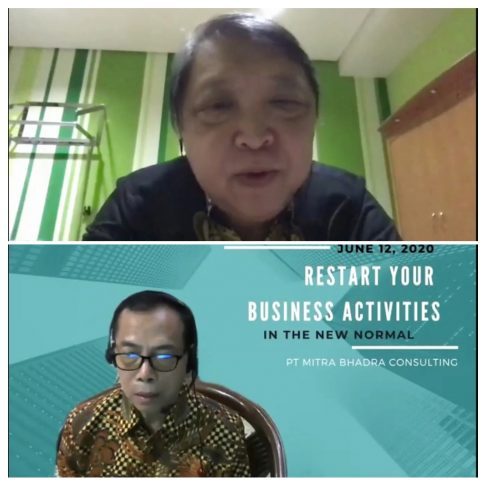ILUNI FEB UI Co-hosts UI Prominent’s Webinar Entitled Survival of the Fittest
Nino Eka Putra ~ FEB UI Public Relations Officer
DEPOK, Friday, 12/6/2020 – The Alumni Association of the Faculty of Economics and Business, Universitas Indonesia (ILUNI FEB UI), and UI Prominent, a subsidiary of UI Corpora, jointly held a webinar entitled Survival of the Fittest: The World has Changed, How about Your Business?”
Speakers at the webinar were Drs. Prodjo Sunarjanto, S.P., ASSA president director who is also a lecturer at FEB UI, and Mas Achmad Daniri, former chairman of KNKG (2014-2019) who is also Senior Partner at Mitra Bhadra Consulting. The webinar was moderated by Syahnan Poerba and Vivi Hadijaya.
Prodjo Sunarjanto, the first speaker, explained that the Covid-19 pandemic has plunged the global economy into recession. The health sector was the first to be affected by the pandemic, followed by the food, economic and financial, social and security sectors before it led to a crisis of confidence. Sectors in the economy affected by Covid-19 are trade, finance, agriculture, livestock, plantations, industry, companies, property, services, and lifestyle.

Demand is dwindling due to fears of the spread of the virus, a decline in global demand for commodities, the tightening of the financial markets and capital outflows, shutdown of distribution and consumption lines, a decrease in public spending/purchasing power, and uncertainty about the future. In addition, the supply side has experienced a decline due to disruptions in the supply chains, economies of scale have become infeasible, work restrictions, increased costs, disrupted distribution channels, problematic imports, and a lack of funds. The biggest contributors to Indonesia’s economy are property and its associated value chains, automotive and its associated value chains, oil and gas, financial services, manufacturing, mining and plantations, and agriculture and its associated value chains.
“To restore the national economy, the government has disbursed Rp598 trillion of funds. Of the total, Rp205.2 trillion was allocated for the demand side in the form of social security (basic food, social assistance, pre-employment cards, BLT, etc.). Another Rp393.4 trillion was allocated for the supply side in the form of fund placement for restructuring, spending guarantee, national investment, tax incentives, local government support, tourism, labor-intensive programs, interest subsidies (which include Rp35.28 trillion of subsidies for 60.66 million accounts),” said Prodjo.
Prodjo went on to say that the new normal has affected the business world. The cost of doing business is increasing relatively drastically, the balance between supply and demand will shift, with a low base, shifting the prices of high-ticket items¸ causing standard of living to return to normal, less competition although substitute goods will appear, a change in the way of doing business, the need for digital promotions, new job skills, and the emergence of a saving habit.
“Companies must create stategies to stay afloat by reviewing their business models, conducting stress tests if the worst-case scenario is 6-12-24 months, conducting a revenue stream assessment of products/divisions/services that are burdensome and need to be removed, setting up new businesses using the asset-light model, focusing on domestic demand, utilizing technology, looking for alternative funding sources outside the bank, implementing work-from-home arrangements for some of the permanent employees, conducting reorganization and payroll cut, and creating opportunities for employees to become value chains,” said Prodjo.
In view of the current situation, business opportunities that meet current needs include food value chains, renewable resources or green products, waste management, e-commerce channels for product marketing, innovation to shift from basic goods to higher value products (repackaging), development, mentoring, coaching, training, and quality resources. Look for businesses that have long and stable revenue streams for the long term and are sought by the public, logistics, facilitate exports of SME products, and collaborate with thriving businesses. “Making money is art, and work is art. But making money from a good business is the best art,” said Prodjo at the end of his presentation.
Mas Achmad Daniri, the second speaker, talked about strengthening Governance Risk Compliance (GRC) towards a new normal. GRC is a set of all capabilities needed to support key performance at every level of the organization. GRC strengthening can be done by involving all employees in the formulation of the code of ethics and code of conduct that are easy to understand, and promoting the code of ethics and code of conduct from top to bottom.

“GRC is enforced as part of the commitment to the integrity pacts, including when logging into a computer, creating an online reporting system via smartphones, providing direct access to employee reporting to directors, building a reward and punishment system, using online applications for procurement of goods/services, and conditions for mutual supervision,” Added Achmad Daniri. (hjtp)
(lem)






